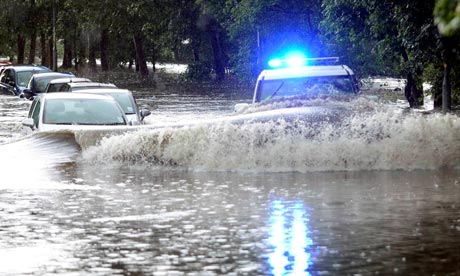Big clean-up begins after storms leave thousands without electricity UK
Flood alerts remain in force after streets are submerged and ‘golf ball’ hail stones fall
- guardian.co.uk, Friday 29 June 2012 18.00 BST

A vast clean-up operation got under way on Friday after heavy rain and storms left thousands of homes without electricity. Many people were evacuated, with severe disruption on the road and rail networks.
Severe summer storms have caused flash floods that saw streets submerged. More than 111,000 lightning strikes were detected across the country, while hail stones “the size of golf balls” caused damage in Leicestershire.
In Shropshire, a man who died after being caught in heavy flooding was named on Friday. Mike Ellis, a maths teacher, died after being swept away by floodwater in a stream at Bittlerley, near Ludlow. A 90-year-old man was among people rescued from vehicles by fire crews after flash flooding in the Bridgnorth area.Mr Ellis’s wife described him as “a gentle caring man” and the “most wonderful husband”.
More rain is forecast but not torrential downpours, though there will be heavy showers – some in flood-hit areas including northern England, the Midlands, Scotland and Northern Ireland. The Environment Agency has flood alerts in place in 10 areas of the UK including East Anglia, the Midlands, the north-eastand the north-west.
Thousands of homes were left without electricity in the north, with 3,000 customers still without power on Fridayyesterday, down from 23,000 on Thursday, according to Northern Powergrid. The worst hit areas include Consett, Whitley Bay, Prudhoe, Shiremoor and Stanhope.
Northern Ireland and the Irish republic were also hit by floods, with a loss of power to more than 10,000 homes in the Cork area and 1,000 in Northern Ireland. Hundreds of homes and businesses were damaged by flooding in the Cork suburb of Douglas, while parts of Belfast and County Antrim were also badly affected.
On Thursday heavy rains caused landslides which forced the cancellation of all East Coast trains between Newcastle and Edinburgh, with limited services resumed by Friday afternoon. Some passengers travelling from London to Glasgow endured journeys of up to 15 hours.
A London to Glasgow Virgin Trains service was stranded between two landslides in the Lake District for more than two hours before being evacuated near Lockerbie after a fire broke out in the front coach of the train. In Newcastle, the city’s metro was underwater, submerged cars were left abandoned on flooded streets and care home residents with learning disabilities had to be evacuated.
On Friday one of the main railways between Scotland and England was closed for the second time in 24 hours, with trains unable to run between Glasgow and Carlisle on the West Coast mainline because of a problem with overhead wires. The three-day Godiva Festival in Coventry was cancelled on Friday, with 100,000 revellers told not to turn up at the city’s War Memorial Park to see acts such as Echo and The Bunnymen and Cast. A statement on the festival website said: “We’re really sorry but finally beaten by devastating weather.”
The cancellation comes after the Isle of Wight festival was hit by torrential rain last weekend, which saw the site flooded causing traffic jams around the island.
The Midlands was hit by intense downpours, with some parts receiving 22mm of rain in one hour – a third of the average rainfall for the month. “We are not going to see the type of heavy rainfall we have seen in the last couple of days, but unfortunately the weather continues to look quite unsettled,” said Sarah Holland from the Met Office. “It will be mainly dry with some heavy showers, with the south-east getting the best of the weather while the worst will hit parts of Wales, the south-west and Yorkshire.”
Sunday is expected to be drier but will remain dull. She added: “As people go back to work on Monday it will remain unsettled with more heavy showers expected in Tuesday.” Wales has seen the wettest June since records began, while this is the second wettest June on record in England. “It has been a disappointing month on all fronts – with many areas being exceptionally wet, very dull and cooler than average,” said Holland.
